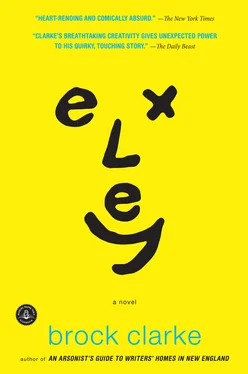“I was on the way to pick you up at Harold’s,” she said.
“What for?” I said.
Mother shrugged. “Come on,” she said. “Let’s go.”
“Where?”
“Special treat,” was all Mother said. She pulled the keys out of the ignition and jingled them at me, like I was a dog who loved to be taken for a ride. I wasn’t. But I got in the car anyway.
Doctor’s Notes (Entry 18)
After speaking with M. at JCCC, I return home, but I have no intention of staying there past seven o’clock; seven o’clock, I know, is when M. and M.’s mother are going to the Crystal to celebrate his birthday. When the clock strikes seven, I “hop” on my Schwinn and pedal to their home. Two of the downstairs rooms are illuminated; there are no cars parked in the driveway. I park my bike on the street, then reconsider and park it around the corner so as not to be seen. Am I thinking like a criminal? No, I am thinking like someone who might be considered a criminal if he didn’t have such a good cause. This is as good a definition of a mental health professional as any.
The house is unlocked. This is as I hoped and planned, and I am not surprised: M.’s mother is a secure woman and secure women do not need to lock their doors to feel secure. I open the door that leads into the kitchen. The kitchen is unremarkable — unremarkable and, indeed, not worth remarking upon . I proceed through it, into the living room. M. has described this room at length; sure enough, there in the corner is M.’s father’s desk. Behind the desk is the window seat. The window seat, I know, is where one can find M.’s father’s copies of A Fan’s Notes . I have one of his copies already, which is more than enough. I walk past it and head toward the stairs, then up the stairs, and into the hallway, turning on lights as I go. First, the bathroom. It, too, is as M. describes it: as with a cave, something within it drips. I turn on the light. The room is half-boy (there is a child-sized toothbrush encrusted with old paste and emblazoned with a caped cartoon superhero) and half-woman (in the shower, a “lady’s razor” and a bottle of shampoo, organic, from Australia — a fact not insignificant, given that M. claims K.’s shampoo is also native to that faraway island continent). I take note of the coincidence, mentally, and move on to M.’s bedroom. I turn on the light. I am tempted to write, “I don’t know what I expected,” but this is merely something one says when one does know what one expects and one’s expectations are not met. I expect the room to look literary , somehow, in some way, but it does not: there are bookshelves and there are books on them — some of them age-appropriate and some not. But that is the extent of its literariness: there are toys and puzzles scattered on the floor and left in various states of midplay and half completion; the wallpaper is blue and dotted with footballs; the lamp on the table next to M.’s bed (unmade) is in the form of a clown, its shade decorated with elephants, trapeze artists, and other creatures of the big top. In other words, it looks like a boy’s room, a normal boy’s room. Next to the lamp is a picture. I turn on the lamp to look at it. It is of M. and his parents. They are sitting in what is obviously a photographer’s studio: the photo’s background is pure mauve. M. is sitting between his parents. His father looks unshaven — unshaven and, indeed, somewhat early in the process of becoming bearded — although he is wearing a white button-down shirt and a red knit tie; his mother looks freshly groomed and beautiful as ever. They are both smiling. I’m sad to say of myself that their smiles sadden me. M. is smiling, too. His arms are linked with the parental units on either side of him. To a mental health professional, the symbolism is unmistakable: without M. between them, they would clearly not be linked. M. is clearly aware of this as well: his smile is toothy and desperate. Given what I just wrote, and felt, about M.’s parents’ smiles, this should not sadden me. But it does. Even the room itself suddenly saddens me: it is a boy’s room, but the boy who sleeps in it is more than a boy. Or less than one. I don’t know which, and either way, I don’t yet know how to restore his boyhood. As his mental health professional, I should know. This saddens me most of all. Oh, M ., I think, I am failing you and I am sorry , and then I leave the room and head toward his mother’s.
I say “his mother’s room,” and this is not merely wishful thinking on my part: there are no signs of M.’s father in it — no men’s clothes, no pictures of M.’s father, no “anything.” I’d like to say that I was strong and did not bury my face in M.’s mother’s pillow, did not open her drawers and run my fingers through her clothes, but I was not strong — was not strong and, indeed, am not strong . After indulging my weakness for some time, I close the drawers and only then notice, on top of the dresser, a page torn from a newspaper, which is itself paper-clipped to a manila envelope. It is page one of the “local” section of our local paper, dated today. I read it quickly. There are the usual dairy farm transactions — so-and-so has invested in such and such new milking technology — and next to them is the news from Fort Drum. The news is always sad, and today is no exception: a soldier was killed recently in Iraq, and there will be a ceremony in his honor at our Public Square tomorrow. I don’t recognize the name of the poor man, but perhaps this is why M.’s mother has saved the newspaper: perhaps it has something to do with her job. In any case, I’m happy to have found it: perhaps I’ll rely on my privileges as a mental health professional to withdraw M. from school tomorrow so that I can take M. to the ceremony, so that he might realize that he should not pretend that his father has been wounded in battle, so that he should feel grateful that wherever his father is (and now that I know that M. is not teaching a class and so K. is not a student in it, I feel more certain than ever that K. is M.’s father’s “girlfriend” and that they are “shacked up” together somewhere), M. is fortunate his father is there and not being eulogized on the Public Square (let alone convalescing in the VA hospital). I decide to “pocket” the article and the envelope to which it’s clipped, so as to remind myself of the ceremony in the morning. Besides, surely M.’s mother will not miss it. One never misses a torn piece of newspaper. One knows that one guarantees its future lostness the moment one tears it from the rest of the paper.
All that is well and good. But I still have not found what I have come to find: M.’s journal. I search the entire house and still I cannot find it. Oh, despair! And oh, how quickly the cry of despair can turn into the cry of surrender! I am prepared to do exactly that when I remember one place I have not searched: the window seat. I assumed that the window seat contained only what M. has told me it contains: copies of A Fan’s Notes . But it now occurs to me that the window seat might contain more than what I know it contains. It is like the juvenile mind in this way.
I hurry downstairs. There is a lamp on the desk; I turn it on, then open the window seat. As expected, there is a jumble of books, both hard- and softcover. I push them to the side until I reach the bottom. At the bottom I see a notebook and also several loose pieces of paper stacked and folded in two. I reach down, extract them, and place them on the desk so that I might have a closer look. First, the pieces of paper: they are all lessons M. has learned from his father, who learned them, apparently, from Exley. I read them quickly, then return them to the window seat. Then I open the notebook. It is the journal in which I suggested M. keep his thoughts. What a good kid he is , I think, doing what I suggested he do. What a bad man I am , I think, reading the journal uninvited, especially given that I promised M. I’d read his journal only upon invitation. But then I forget what a bad man I am once I begin reading — which is, I suppose, one of the reasons why people read — and instead scour the journal to see if I’m mentioned in it — which is, I suppose, one of the other reasons why people read.
Читать дальше












